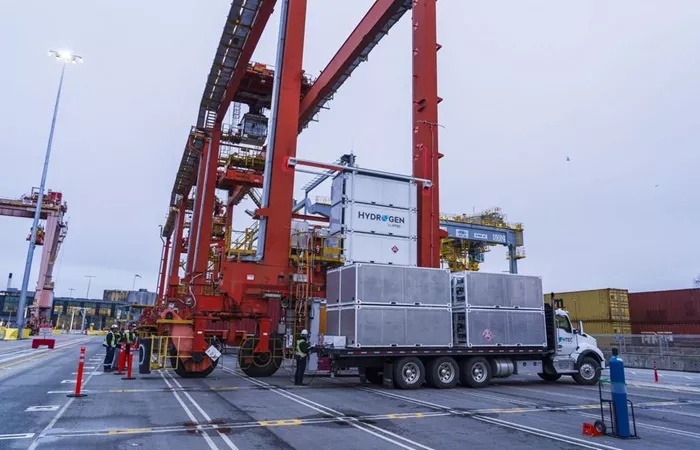DP World has successfully completed initial testing of a hydrogen fuel cell-powered rubber-tired gantry (RTG) crane at the Port of Vancouver. This marks a significant milestone in the company’s efforts to decarbonize its port operations.
The RTG crane is part of a larger project to explore the possibility of converting DP World’s global fleet of 1,500 RTG cranes to hydrogen power. Currently, 19 RTG cranes at the Vancouver terminal account for 50% of the terminal’s diesel consumption, emitting over 4,200 tonnes of CO2 annually. The switch to hydrogen technology is expected to reduce or even eliminate these emissions.
The hydrogen-powered crane can store up to 135 kg of compressed hydrogen across 15 pressurized tanks. This hydrogen fuels a fuel cell system that charges a high-voltage battery, which in turn powers the crane’s electric drive. Additionally, the system captures energy during container lowering, improving efficiency by reducing overall energy demand.
The pilot project began in October 2023. In its first phase, a diesel-powered RTG crane was retrofitted with a Hydrogen-Electric Generator (HEG), a battery energy storage system, hydrogen storage, and regenerative energy capture technology. The ongoing second phase involves a one-year field trial to gather data on hydrogen consumption, energy generation, and regenerative energy capture.
This data will allow DP World to compare the hydrogen-powered RTG with its conventional diesel counterpart in terms of productivity, reliability, maintenance, costs, and environmental impact.
The project is the result of collaboration between DP World, TYCROP Manufacturing Ltd., H2 Portable, and HTEC. TYCROP and H2 Portable worked together to design the HEG system, while HTEC provided the hydrogen storage and supply.
Scott Mason, President and CEO of TYCROP, praised the achievement, noting that during factory tests, the hydrogen system operated for 16 hours, lifting and lowering a 40-ton load 105 times, all while emitting only steam instead of the 400 kilograms of CO2 typically produced by a diesel-powered unit.
Jeff Grant, Vice President of Transportation Solutions at HTEC, highlighted the importance of collaboration in advancing clean energy solutions. “This project demonstrates how partnerships are driving the transition to cleaner energy,” he said.
If the field trial proves successful, DP World plans to convert its remaining 25 diesel-powered RTG cranes at the Vancouver and Prince Rupert ports. The company is also exploring the use of electric terminal tractors at the Port of Vancouver and acquiring a fleet of electric vehicles.
The Port of Vancouver was chosen for this pilot project due to its established hydrogen and fuel cell infrastructure and support from the Province of British Columbia.
DP World is a global leader in port operations and logistics, headquartered in Dubai, United Arab Emirates.
TYCROP Manufacturing, based in British Columbia, Canada, specializes in designing and manufacturing custom industrial equipment and transportation solutions. H2 Portable, a Canadian company, focuses on developing portable hydrogen fuel cell generators as a cleaner alternative to fossil fuel-based power systems.

